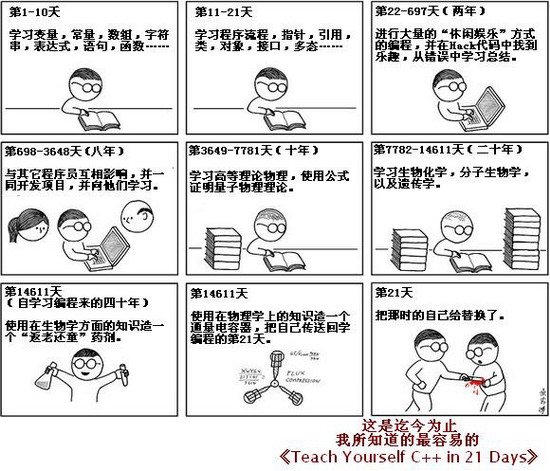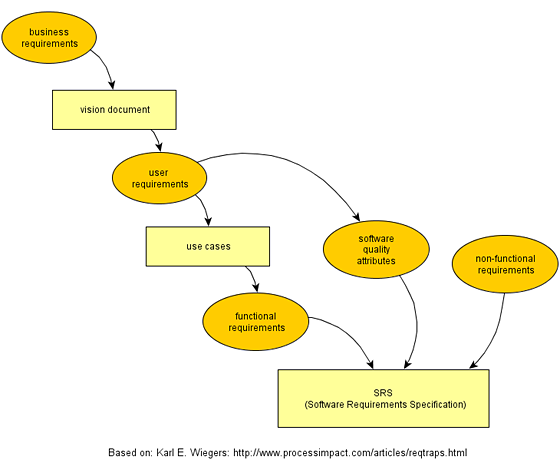-
Notifications
You must be signed in to change notification settings - Fork 0
Home
Welcome to the cpp wiki!
最近接到一个任务,为部门编写一份C++学习路线图。回想了一下5年来使用C++的经历,发现好像也没有学会什么。 看到STL、模板和泛型,就会感到头大,调试CORE文件也没有那么得心应手。
任务对我来说有些艰巨,感觉更适合由我司的首席技术专家来操刀。不过,抱着未来成为首席技术专家的梦想,仗着1024K的脸皮厚度, 决定借此契机整理完善自己的学习路线图。
- 编程中找到乐趣
- 阅读他人的代码
- 与他人进行交流
- 让程序更好维护
- 了解你的计算机
- C++基本语法 《Learning C++》
- 基本语法总结 《Basic C++ roadmap》
- 代码编写规范 《Goole Code Style》
-
Boost Build System 通过b2进行程序编译
概念 《difference between BuildSystem and b2 and jam》
指引 《Tutorial》
- 面向对象
- 设计模式 《Design Pattern》
https://www.cprogramming.com/algorithms-and-data-structures.html
熟练掌握常用的数据结构如栈、队列、堆、哈希表等常用数据结构的使用方法和使用场景。 了解算法的基本知识(如时间复杂度、空间复杂度等)及常用算法(如排序算法、搜索算法等)
-
C++ STL
vector, array, deque, map等
-
BOOST
boost::filesystem, boost::date_time, boost::chrono, boost::algorithm,
boost::asio, boost::thread,
boost::asio::ip::tcp, boost::asio::ip::udp
boost::function, boost::bind,
boost::regex,
boost::property_tree
-
Boost::Test
《通过Test编写测试用例》 -
Turtle 《通过Turtle编写测试用例》
- GDB
- WinGbg
-
熟悉linux操作系统
-
Windows 操作系统
- C++
- Java
- Python
- Shell
- 一门支持类抽象(class abstraction)的语言(如Java或C++)
- 一门支持函数抽象(functional abstraction)的语言(如Lisp)
- 一门支持句法抽象(syntactic abstraction)的语言(如Lisp)
- 一门支持说明性规约(declarative specification)的语言(如Prolog或C++模版)
- 一门支持协程(coroutine)的语言(如Icon或Scheme)
- 一门支持并行处理(parallelism)的语言(如Sisal, Clojure or Go)
The Definitive C++ Book Guide and List 中文版本
- Programming: Principles and Practice Using C++ (Bjarne Stroustrup) (updated for C++11/C++14) An introduction to programming using C++ by the creator of the language. A good read, that assumes no previous programming experience, but is not only for beginners.
- C++ Primer * (Stanley Lippman, Josée Lajoie, and Barbara E. Moo) (updated for C++11) Coming at 1k pages, this is a very thorough introduction into C++ that covers just about everything in the language in a very accessible format and in great detail. The fifth edition (released August 16, 2012) covers C++11. [Review]
- A Tour of C++ (Bjarne Stroustrup) (EBOOK) The “tour” is a quick (about 180 pages and 14 chapters) tutorial overview of all of standard C++ (language and standard library, and using C++11) at a moderately high level for people who already know C++ or at least are experienced programmers. This book is an extended version of the material that constitutes Chapters 2-5 of The C++ Programming Language, 4th edition.
- Accelerated C++ (Andrew Koenig and Barbara Moo) This basically covers the same ground as the C++ Primer, but does so on a fourth of its space. This is largely because it does not attempt to be an introduction to programming, but an introduction to C++ for people who've previously programmed in some other language. It has a steeper learning curve, but, for those who can cope with this, it is a very compact introduction into the language. (Historically, it broke new ground by being the first beginner's book to use a modern approach at teaching the language.)
- Not to be confused with C++ Primer Plus (Stephen Prata), with a significantly less favorable review.
- Effective C++ (Scott Meyers) This was written with the aim of being the best second book C++ programmers should read, and it succeeded. Earlier editions were aimed at programmers coming from C, the third edition changes this and targets programmers coming from languages like Java. It presents ~50 easy-to-remember rules of thumb along with their rationale in a very accessible (and enjoyable) style. For C++11 and C++14 the examples and a few issues are outdated and Effective Modern C++ should be preferred. [Review]
- Effective Modern C++ (Scott Meyers) This is basically the new version of Effective C++, aimed at C++ programmers making the transition from C++03 to C++11 and C++14.
- Effective STL (Scott Meyers) This aims to do the same to the part of the standard library coming from the STL what Effective C++ did to the language as a whole: It presents rules of thumb along with their rationale. [Review]
- More Effective C++ (Scott Meyers) Even more rules of thumb than Effective C++. Not as important as the ones in the first book, but still good to know.
- Exceptional C++ (Herb Sutter) Presented as a set of puzzles, this has one of the best and thorough discussions of the proper resource management and exception safety in C++ through Resource Acquisition is Initialization (RAII) in addition to in-depth coverage of a variety of other topics including the pimpl idiom, name lookup, good class design, and the C++ memory model. [Review]
- More Exceptional C++ (Herb Sutter) Covers additional exception safety topics not covered in Exceptional C++, in addition to discussion of effective object oriented programming in C++ and correct use of the STL. [Review]
- Exceptional C++ Style (Herb Sutter) Discusses generic programming, optimization, and resource management; this book also has an excellent exposition of how to write modular code in C++ by using nonmember functions and the single responsibility principle. [Review]
- C++ Coding Standards (Herb Sutter and Andrei Alexandrescu) “Coding standards” here doesn't mean “how many spaces should I indent my code?” This book contains 101 best practices, idioms, and common pitfalls that can help you to write correct, understandable, and efficient C++ code. [Review]
- C++ Templates: The Complete Guide (David Vandevoorde and Nicolai M. Josuttis) This is the book about templates as they existed before C++11. It covers everything from the very basics to some of the most advanced template metaprogramming and explains every detail of how templates work (both conceptually and at how they are implemented) and discusses many common pitfalls. Has excellent summaries of the One Definition Rule (ODR) and overload resolution in the appendices. A second edition covering C++11, C++14 and C++17 has been already published . [Review]
- Modern C++ Design (Andrei Alexandrescu) A groundbreaking book on advanced generic programming techniques. Introduces policy-based design, type lists, and fundamental generic programming idioms then explains how many useful design patterns (including small object allocators, functors, factories, visitors, and multimethods) can be implemented efficiently, modularly, and cleanly using generic programming. [Review]
- C++ Template Metaprogramming (David Abrahams and Aleksey Gurtovoy)
- C++ Concurrency In Action (Anthony Williams) A book covering C++11 concurrency support including the thread library, the atomics library, the C++ memory model, locks and mutexes, as well as issues of designing and debugging multithreaded applications.
- Advanced C++ Metaprogramming (Davide Di Gennaro) A pre-C++11 manual of TMP techniques, focused more on practice than theory. There are a ton of snippets in this book, some of which are made obsolete by typetraits, but the techniques, are nonetheless useful to know. If you can put up with the quirky formatting/editing, it is easier to read than Alexandrescu, and arguably, more rewarding. For more experienced developers, there is a good chance that you may pick up something about a dark corner of C++ (a quirk) that usually only comes about through extensive experience.
-
The C++ Programming Language (Bjarne Stroustrup) (updated for C++11) The classic introduction to C++ by its creator. Written to parallel the classic K&R, this indeed reads very much alike it and covers just about everything from the core language to the standard library, to programming paradigms to the language's philosophy. [Review]
-
C++ Standard Library Tutorial and Reference (Nicolai Josuttis) (updated for C++11) The introduction and reference for the C++ Standard Library. The second edition (released on April 9, 2012) covers C++11. [Review]
-
The C++ IO Streams and Locales (Angelika Langer and Klaus Kreft) There's very little to say about this book except that, if you want to know anything about streams and locales, then this is the one place to find definitive answers. [Review]
-
C++11/14 References:
-
The C++ Standard (INCITS/ISO/IEC 14882-2011) This, of course, is the final arbiter of all that is or isn't C++. Be aware, however, that it is intended purely as a reference for experienced users willing to devote considerable time and effort to its understanding. As usual, the first release was quite expensive (00+ US), but it has now been released in electronic form for 0US.
-
The C++14 standard is available, but seemingly not in an economical form – directly from the ISO it costs 198 Swiss Francs (about 00 US). For most people, the final draft before standardization is more than adequate (and free). Many will prefer an even newer draft, documenting new features that are likely to be included in C++17.
-
Overview of the New C++ (C++11/14) (PDF only) (Scott Meyers) (updated for C++1y/C++14) These are the presentation materials (slides and some lecture notes) of a three-day training course offered by Scott Meyers, who's a highly respected author on C++. Even though the list of items is short, the quality is high.
-
The C++ Core Guidelines (C++11/14/17/…) (edited by Bjarne Stroustrup and Herb Sutter) is an evolving online document consisting of a set of guidelines for using modern C++ well. The guidelines are focused on relatively higher-level issues, such as interfaces, resource management, memory management and concurrency affecting application architecture and library design. The project was announced at CppCon'15 by Bjarne Stroustrup and others and welcomes contributions from the community. Most guidelines are supplemented with a rationale and examples as well as discussions of possible tool support. Many rules are designed specifically to be automatically checkable by static analysis tools.
-
The C++ Super-FAQ (Marshall Cline, Bjarne Stroustrup and others) is an effort by the Standard C++ Foundation to unify the C++ FAQs previously maintained individually by Marshall Cline and Bjarne Stroustrup and also incorporating new contributions. The items mostly address issues at an intermediate level and are often written with a humorous tone. Not all items might be fully up to date with the latest edition of the C++ standard yet.
-
cppreference.com (C++03/11/14/17/…) (initiated by Nate Kohl) is a wiki that summarizes the basic core-language features and has extensive documentation of the C++ standard library. The documentation is very precise but is easier to read than the official standard document and provides better navigation due to its wiki nature. The project documents all versions of the C++ standard and the site allows filtering the display for a specific version. The project was presented by Nate Kohl at CppCon'14.
blogs
C++11 https://zh.wikipedia.org/wiki/C%2B%2B11
roadmap http://www.cbkihong.com/download/cpprm.pdf
learning source https://www.tutorialspoint.com/cplusplus/cpp_useful_resources.htm
Teach Yourself Programming in Ten Years http://norvig.com/21-days.html
top 3% of freelance talent https://www.toptal.com/

